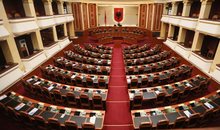
 Flash News
Flash News
Germany extends the stay of its troops in Kosovo
Greek police raid Albanian cells in Korydhalos, discover arsenal and drugs at "prison mafia boss"
The famous soprano of TKOB passes away prematurely
Sailing suspended due to bad weather in Vlora
Megaoperation/ Group based in Durres, names of Albanian traffickers revealed
EC figures: Public debt in Albania reaches 82.7% of GDP, a record in the region

The debt that the government has taken to carry out additional expenses that cannot be covered by budget revenues is estimated to have reached 82.7% of the Gross Domestic Product in the second quarter of 2022, according to the latest report of the European Commission on candidate countries and pre-candidate countries .
This is the highest level in the region, even surpassing Montenegro, which had the highest debt until now.
According to the European Commission report, the stock of public debt rose to 82.7% of GDP, up from 74.9% in the previous quarter and 68.8% of GDP a year ago.
While the Ministry of Finance, in the public debt bulletin, reports the debt level at much lower levels of 69.5% of GDP in the first quarter of 2022, down from 73.1% at the end of 2021.
In the region, Kosovo has the lowest level of public debt, with 20.3% of GDP, Bosnia and Herzegovina (35.4%), North Macedonia (47%), Serbia (56.5%), Mt. ZI (76.6%) .
In 2020, all countries increased their public debt, as governments designed aid packages to support economies that were hit by quarantines to contain the spread of Covid-19. The record was reached by Montenegro, which brought the debt to over 100% of GDP. Albania, although it increased its debt, gave the lowest aid packages at around 1% of GDP, according to estimates by the International Monetary Fund.
Then, with the recovery of the economy, the debt began to decrease in all countries, but in Albania, according to the figures of the European Commission, it turns out that the trend is increasing.
In recent years, the International Monetary Fund has recommended the government to reduce the public debt, focus on making the necessary expenses and direct a part of the income for the protection of the needy classes.
The main risk, according to the IMF, is that if the economy worsens, the deficit and debt would continue to rise and, as a result, the government would not have the money available to reduce the effect on the economy of this shock. Now that inflation threatens to slow the economy, a high debt does not create fiscal space for the government to support the economy and the needy.
According to the Fund, it would be advisable to moderate the overly ambitious public investments financed with domestic resources to protect priority expenditures for social protection, health care (especially vaccination), and earthquake reconstruction as well as to increase contingency./Monitor
Latest news



Germany extends the stay of its troops in Kosovo
2025-05-21 22:19:22
Journalist: Xhevdet Troplini alongside a politician
2025-05-21 22:00:07
Amnesty International: Camps in Albania, a reflection of an inhumane system
2025-05-21 21:49:09
This is the first Albanian justice collaborator
2025-05-21 21:39:45
Bitcoin breaks historical record: Reaches $109,302
2025-05-21 21:36:06
Raped by colleague at the civil registry office, victim fired from job
2025-05-21 21:08:47
Hyn në fuqi vendimi i BSH/ Kredia për blerje banese kufizohet nga 1 korriku
2025-05-21 21:04:37
“Nga dhuna e burrit humba fëmijën”, nëna e dy të miturve kërkon drejtësi
2025-05-21 20:50:23
The government extends the stay of Ukrainians in Albania
2025-05-21 20:45:04
Social networks: Friend or foe of our personal relationships?
2025-05-21 20:22:33







The famous soprano of TKOB passes away prematurely
2025-05-21 18:27:50

Donald Trump's son says he might one day run for US president
2025-05-21 17:53:20

Israel's Eurovision result raises questions about voting
2025-05-21 17:23:29
Florence, two Albanians arrested with 23 kg of cocaine
2025-05-21 17:03:20
Sailing suspended due to bad weather in Vlora
2025-05-21 16:58:12
The abolition of the vote as a triumph of banality
2025-05-21 16:41:56


Operation "Bridge"/ Ekil Nderjaku is sentenced to "prison arrest"
2025-05-21 16:08:32

Who needs more physical exercise: Women or men?
2025-05-21 15:43:25
Former Ukrainian politician shot dead near a school in Madrid
2025-05-21 15:32:18
Operation "Bridge"/ Ekil Nderjaku is given another security measure in his cell
2025-05-21 15:22:37
Chocolate will reach high prices! Cocoa production in serious crisis
2025-05-21 15:11:34




"Grandma", "beast", the nicknames used by Albanian and Italian traffickers
2025-05-21 14:26:47
Pope Leo asks Israel to allow humanitarian aid into Gaza
2025-05-21 14:18:42

Document/ How did Nuredin Dumani hit Xhevdet Troplini's group of traffickers?
2025-05-21 14:05:45

Megaoperation/ Group based in Durres, names of Albanian traffickers revealed
2025-05-21 13:42:44
Former politician shot dead outside his children's school
2025-05-21 13:39:27
A ka BE-ja ende mjete efektive për t'i shkaktuar dhimbje Rusisë?
2025-05-21 13:26:33
Berisha: We will never accept such choices, no one can force us to accept them
2025-05-21 13:25:29




A 24-year-old man was found dead in Lake Farka.
2025-05-21 12:37:34

The abolition of the vote as a triumph of banality
2025-05-21 12:18:53

The only name for May 11th is: Electoral Terrorism
2025-05-21 12:06:25


Letter-order from Belgium, SPAK checks 4 premises, 33-year-old arrested in Berat
2025-05-21 11:37:31
Hajj 2025/ Everything you need to know about the annual pilgrimage to Mecca
2025-05-21 11:28:43

The appeal of the GJKKO leaves the head of the Road, Roven Zeka, in prison
2025-05-21 11:02:16

Kuçova! 66-year-old man sexually harasses 17-year-old girl
2025-05-21 10:41:40

Mental disorders and obesity threaten adolescents
2025-05-21 10:22:04


19 killed in Gaza by Israeli attacks, most of them children
2025-05-21 09:50:03
Tabaku: SP seeks to usurp independent institutions
2025-05-21 09:40:19



Is the Socialist Party's supermajority a danger to democracy?
2025-05-21 09:01:54


Video/ Explosives found at Veliera in Durrës, near Vangjush Dako's apartment
2025-05-21 08:32:15
The lack of flights at Vlora airport jeopardizes tourism guarantee contracts
2025-05-21 08:22:54
Horoscope, what do the stars have in store for you today?
2025-05-21 08:09:02

Morning Post/ In 2 lines: What mattered yesterday in Albania
2025-05-21 07:47:36







38 people arrested for conspiracy in Venezuela, among them an Albanian
2025-05-20 21:18:15

Torrential rainfall hits southeastern France, 3 confirmed victims
2025-05-20 20:49:14

Shehaj: Our votes will never unite with Edi Rama
2025-05-20 20:24:31
The ship "Butrinti" rescues 13 migrants in the Aegean Sea, including 2 children
2025-05-20 20:01:12
Video/ Revolt in Corfu prison, Albanians and Georgians set fire to cells
2025-05-20 19:51:04
Biden diagnosed with cancer, questions about his health in the White House
2025-05-20 19:37:01


